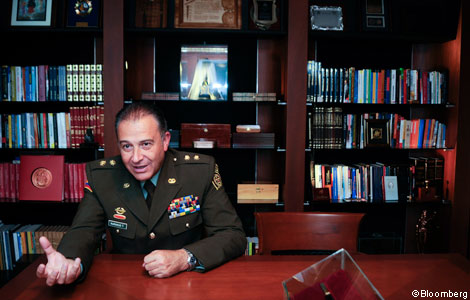
必须为每天出生入死、每48个小时就要丧生一人的手下鼓劲打气的老板并不多。但这是哥伦比亚全国警察总长奥斯卡•纳兰霍(Oscar Naranjo)上将真实生活中的一面。他统领着16万余名警察——哥伦比亚警力为拉美之最,在全球也首屈一指。
他支付的薪水也比不上私人企业,更远低于犯罪团伙的行贿金额。黑帮组织是哥伦比亚局势动荡的源头之一。
“警察,不能以薪水高低来评判好坏,因为干坏事往往更容易来钱。关键在于树立一套价值观体系。”
领导人在谈到培养玄乎的企业道德时,总给人一种背诵管理手册的感觉。但纳兰霍上将似乎怀着一种人道主义的人生观。“它建立在人类尊严和负责任地使用职权的基础上,尤其是相互尊重。”他在波哥大的办公室弥漫着冥想气氛,办公桌上点着一根蜡烛。
或许是因为受过耶稣会教育,纳兰霍上将具有严谨的逻辑思维。他历数18世纪以来各个不同时期的执法情况。他认为,当今的警察必须充当“社会行动者”(social actor)。
“直到近些年,世界各国警察仍然过度着眼于保护国家,如今我们保护的重点是联合国所称的‘人的安全’——我们保卫的不是国家这个抽象的实体或者宪法制度,而是每个公民。”
由此带来的公众认同和信任,反过来会提升身为警察的工作自豪感,而这正是纳兰霍上将提倡的价值观体系的核心。它是构成所有现代服务业都重视的互惠互利关系的一个因素。
纳兰霍上将同样富有逻辑地列举了警察队伍面临的四大威胁:低效率、滥用权力、腐败,以及——很明显的一点——冷漠。“满足感从哪里来?来自于拯救生命。”
纳兰霍上将面临着巨大的挑战。哥伦比亚不仅有着西半球最长久的动乱历史,而且在过去20年里,该国打掉的一些犯罪组织是世界上最残暴、最有钱的,其中包括大毒枭帕布洛•艾斯科巴(Pablo Escobar)。此人的落网,纳兰霍上将起到了关键作用。
然而,去年哥伦比亚警察部门平均每一个空缺有20名应征者。而该国警察部门所配备的硬件,在其他地方差不多可以组建一支军队了——包括70架直升机和40架飞机。
在过去8年里,杀人案总数下降了一半。全国杀人犯罪率降至25年来最低水平,为每10万人中有32起。
在打击毒品交易中,除了打造专业化警察队伍——他们如今在阿富汗、塞拉利昂、几内亚比绍共和国及其他11个国家培训警察——他还采取种种措施对付腐败,如对1.4万名警官测谎,制定了一份高危贿赂区的地图,让警官们定期换岗。旨在增添警察工作吸引力的其他措施包括:在教育和医疗方面为警察及其家属提供支持,发放不太突出军事风格的新警服,以形成警察自身的特色。
作为哥伦比亚首位被授予四星上将军衔的警察总长,纳兰霍上将外表看上去就像个军人。但是,他办公桌后的一顶英式警察头盔说明他是一位顶尖的、一流的警察——按照每年颁发一个奖项的加拿大皇家骑警(Royal Canadian Mounted Police)的话来说,就是世界最棒的。
提到加拿大,他表示:“警察是这个国家的一个象征,这在世界上是绝无仅有的。”言外之意,大概寄托着他对本国警察有朝一日也能达到这种境界的希望。
他的任务是艰巨的。这是月中的一个周五,人人都刚领了工资。他知道,当天晚上波哥大将会发生6000起打斗事件。“当然会有苦恼的时候,但是有人放弃了吗?没有。医生会放弃救人吗?”
译者/何黎
http://www.ftchinese.com/story/001037945

There are not many bosses who have to motivate staff in work so dangerous that one of them is killed every 48 hours. But that is a basic fact of life for General Oscar Naranjo, the head of Colombia’s 160,000-strong national police force – the biggest in Latin America and one of the largest in the world.
Nor is he able to pay salaries that compare with the private sector, much less with the bribes on offer from the organised crime groups that have been part of Colombia’s turbulent backdrop.
“The police cannot be good or bad cops depending on the pay, because crime will always find a way to offer better pay,” he says. “The difference has to be in generating a system of values.”
Leaders who talk about the importance of developing a corporate ethical mystique sometimes sound as if they are parroting a management manual. But Gen Naranjo, who has a candle burning on the desk of his meditative Bogotá office, appears to be driven by a humanistic outlook on life. “It’s based in the dignity of the human being and the responsible use of liberty – especially mutual respect.”
It is perhaps because of his Jesuit education that the general deploys a schematic logic, identifying different epochs of law enforcement dating back to the 18th century. He argues that police officers today need to be “social actors”.
“Until recent years, police around the world were too focused on defending the state,” he explains. “Now we are what the United Nations calls ‘human security’ – not defending the state as an abstract entity or constitutional regime, but defending every citizen.”
The resultant public recognition and confidence in turn boosts the workforce’s pride in the job – which is at the heart of the system of values he tries to promote. It forms part of the two-way street that any modern-based service industry will recognise.
In the same vein, he lists the four biggest threats to an effective police force as inefficiency, abuse of power, corruption and – revealingly – indifference. “Where is the satisfaction? It’s in saving lives.”
The challenges Gen Naranjo has faced are immense. Colombia not only has the longest-running rebel insurgency in the western hemisphere, for the past 20 years it has also faced down some of the most ruthless and well-funded criminal networks in the world – including drug lord Pablo Escobar, in whose downfall Gen Naranjo played a key role.
Yet last year there were 20 applicants for each new job in a force that has at its disposal hardware that elsewhere might constitute an army – including 70 helicopters and 40 aeroplanes.
Over the past eight years, the overall number of homicides has halved. The national rate is at its lowest level in 25 years at 32 per 100,000.
As well as professionalising a force that now trains police in Afghanistan, Sierra Leone, Guinea-Bissau and 11 other countries in the fight against narcotics trafficking, he has also tackled corruption by polygraphing 14,000 officers, developing a map of high-risk bribery zones and regularly rotating police officers. Other measures to make the job more appealing have included buoying up schools and health services for police and their families and introducing a less military-style uniform to give officers a distinct identity.
Colombia’s first police chief to be promoted to the rank of four-star general, Gen Naranjo himself has the look of a military man. But a British bobby’s helmet behind his desk illustrates that he is first and foremost a copper – the world’s best, according to the Royal Canadian Mounted Police, which hands out an award every year.
“Nowhere else is the police a symbol of that country,” he notes of Canada, in a telling aside of what he perhaps hopes Colombia’s police may one day become.
In the meantime he has his work cut out. It is a Friday in the middle of the month, everyone has just been paid and he knows there will be 6,000 fights in Bogotá tonight. “Of course there are moments of anguish, but does one give up? No – do doctors?”
没有评论:
发表评论